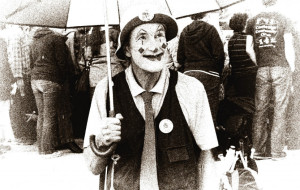Coming up on the 14th July, Beeston Tales is bringing you the next in its program of masterclasses for storytellers. Internationally acclaimed performer Fred Versonnen is stopping off with us as he travels from Belgium to The Festival at the Edge.
Clowning is a beautiful way of making connections. Connections with your audience, connections with parts of yourself you don’t always talk to. Fred has a lively and colourful background as a street performer, jester, stilt walker, fire crasher, clown, juggler and storyteller. He currently teaches at Circus School and spent many years working in Children’s Hospitals. In this workshop he’ll introduce storytellers to some useful clowning techniques and games. Learn to be fully present. Learn to embrace judgement and vulnerability. And who knows, maybe you’ll learn how to make someone laugh!
This workshop is taking place upstairs at The White Lion Bar and Kitchen. Turn up at 10:30 for an 11.00 start. Wear loose clothing. Expected end time is 16:30. This workshop will cost £35 and includes lunch provided by The White Lion. Please let us know of any dietary requirements when you book. Book by sending a cheque to Mike, by emailing us to confirm details or via the paypal link below that says Book Now.
Perhaps you’re not convinced of the link between clowning and storytelling? Read this personal account by Simon Sylvester who attended one of Fred’s workshops several years ago in Brigsteer.
“Last month, at Dreamfired, I saw storyteller Fred Versonnen perform the amazing Elephant Story. The next morning, I attended his clowning workshop in Arnside. This had almost nothing to do with the stereotypical idea of clowning—no silly noses, no silly shoes—and was essentially a 101 on delivery, performance and body language.
Fred warned us at the start of the session that it might take us to some uncomfortable places. I didn’t believe him, but he was right. It’s taken me this entire month to process some of the things that happened in that class. I’m not sure I’ll ever totally get to grips with it, but at the same time, I no longer think I need to. I just wanted to record a few thoughts on what clowning means to me.
I’m not going to talk about the specific activities Fred led us through. They were plentiful, varied, invigorating, intense and brilliantly useful, but they will mean different things to each person who attended, and I don’t feel the need to dissect the actual workshop. I want to talk about what I learned.
I learned that I’m frightened of embarrassment. Most of us are, probably. During the workshop, we performed tasks specifically designed to undermine dignity and strip away the topmost layers of self-respect. I found myself trying to rationalise the embarrassment by imposing a narrative upon it, but every time, Fred forced me to confront it.
‘For a clown, embarrassment is a gift,’ he said.
In this way, I learned that clowns are truly fearless.
I also learned to wait.
In a world consumed with noise and signals, the clown is silent. She waits, absorbing everything, and then she waits some more, until the wait itself becomes excruciating—until the pause itself becomes the embarrassment—and then she responds. In that pause, the clown is naked. Every part of her is laid open for the world to see. The clown waits long enough for the audience to connect, to project their own feelings onto the situation, to drown in empathy, to cringe in anticipation. Every part of them is laid wide open. This is the tragedy of the clown, and the triumph. It has nothing to do with face paint or comedy trousers. Laurel and Hardy are clowns, and Pennywise is not.
I couldn’t live that way, but I’m trying to bring some of it into in my own readings. At the Flashtag story slam, I made myself pause, and wait, then wait some more. I took a stupid hat onstage for my final story, and I forced myself to wear it. I tried to share anticipation of what was coming next with the audience. It was, without a doubt, the happiest I’ve ever been with my performance—the best I’ve ever read my stories. For everything I learned, I’m not sure I’ll ever know how to apply it properly. But I think I understand, now, that not knowing is itself part of clowning. It is Zen—pure action, without thought. I think too much.
At the start of this post, I said that the workshop had nothing to do with silly noses. That isn’t entirely true. At the very start of the session, as people were still arriving, we gathered in the kitchen to wait. Fred began to ransack the drawers, looking for props to use in the workshop. He found an orange ping pong ball. In a single, fluid motion, he spun to face me, bringing the ball to his nose, and he grinned. Just as quickly, he replaced the ball and closed the drawer. But in that second, or half a second, he’d become a clown. His face changed, his body changed—with the sheer, magnificent, wondrous joy of finding a ping pong ball in a kitchen drawer.
I don’t think I’ll ever be able to articulate what happened in that workshop. I don’t need to articulate it, of course, but I want to; and that is why I will never be a true clown. A clown wouldn’t need to analyse it, because they wouldn’t be scared of it. A clown would simply shrug, smile, and turn to embrace the vastness of this mad, sad, glorious thing that we call life.”
£35. The White Lion Bar, Beeston. 10:30 until 16:30. 14 July 2016. What more do you need to know? Confirm your place below:

Leave a Reply